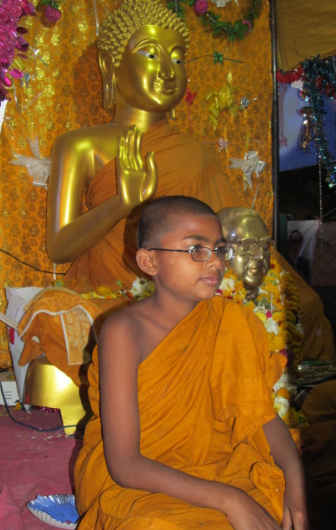Bhante on:
[Wikipedia]
[Google]
[Amazon]
Bhante (Pali; my, ဘန္တေ, ; Sanskrit: ''bhavantaḥ''), sometimes also called Bhadanta, is a respectful title used to address Buddhism, Buddhist bhikkhu, monks and superiors in the Theravada tradition.
The term religiously means "Venerable Sir."

Buddhist Precept & Practice
Gombrich, Richard F. Clarendon Press: 1995 , Page 141

Etymology
''Bhante'' is a gender-neutral term, and may be used to address both bhikkhu, monks and bhikkhuni, nuns. It is the Vocative case, vocative form of the word ''bhadanta'', which confers recognition of greatness and respect. In English, the term is often translated as ''Venerable''. The Nepali language, Nepali terms ''bare'' and ''bande'' have the same derivation and are used to address Buddhist clergy. Bhante can also be used as an honorific or a form of address to specific Buddhist monks, similar to Ajahn, Phra or Luang Por in Thailand or Burmese names, Ashin in Burma (now Myanmar), Rinpoche in Tibet. Some famous monks who are addressed with ''bhante'' include: * Bhante K. Sri Dhammananda * Bhante Dharmawara * Bhante Henepola Gunaratana, Henepola Gunaratana ("Bhante G.") * Bhante Dhammalok Mahasthavir * Bhante Kumar Kashyap Mahasthavir * Bhante Pragyananda Mahasthavir * Sitagu Sayadaw, Bhante Sitagu Sayadaw * Bhante Vimalaramsi Grammatically "bhante" is a vocative case form of a Pali word "bhadanta" (venerable, reverend). The vocative case denotes and is used for address.Gombrich, Richard F. Clarendon Press: 1995 , Page 141
In literature
The title ''bhante'' is used among monks to address superiors within the sangha. The Pali Canon abounds with references to the Buddha's disciples addressing their seniors in this way. While the Buddha is usually addressed with the term ''Bhagavān'', his disciples also sometimes addressed him as ''Bhante''.See also
* Ayya (Pali word), Ayya * Ajahn * Añjali Mudrā, Anjali * Awgatha * Phra (disambiguation), Phra * SayadawReferences